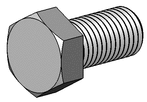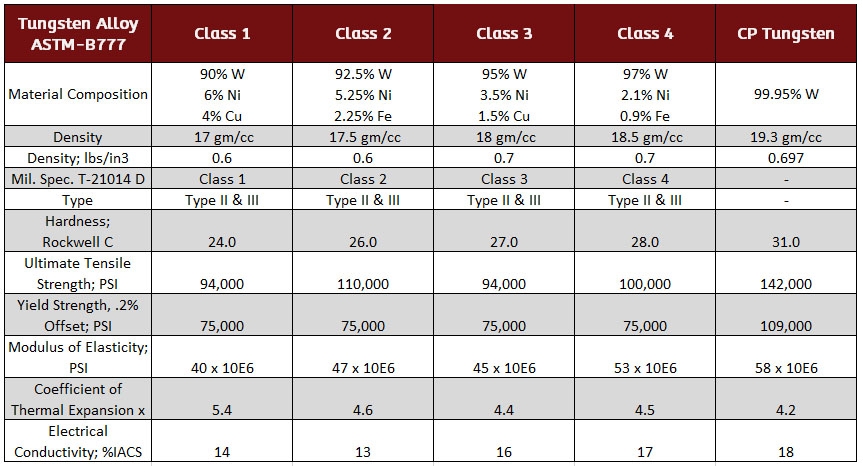Ultra-high density & high temperature / strength stability
- High strength at extreme high temperatures (vacuum)
- Radiopaque to x-rays and other radiation
- Very high density of 19.3 gm/cc
- Excellent corrosion resistance
- Mechanical properties of tungsten screws
- Tungsten material datasheet
Tungsten screws are an ideal material for high temperature stability. Their extremely high melting point of 3420°C, makes tungsten hex head screws useful for some of the hottest vacuum furnace environments. Another attribute of tungsten is its extreme high density. The high mass of tungsten screws make them radiopaque, allowing them to block radiation and show up well on x-rays – even better than lead. In addition, their high density also makes them ideal for balancing rotating parts. Beyond their high mass and temperature stability, tungsten hex head cap screws are also very corrosion resistant.
Tungsten hex head screws are usually made from tungsten alloys per ASTM B777, and range from 90% to 97% pure tungsten, alloyed with nickel and copper or nickel and iron. Fasteners can also be made from Commercially Pure (CP) Tungsten.
Applications
- The heat treating / furnace industry uses tungsten screws in high temperature vacuum furnaces due to tungstens great high temperature strength & stability.
- The oil & gas industry uses tungsten hex head screws for radiation shielding properties to protect equipment used in oil and gas detection, as well as down hole logging for density and ability to withstand intense hydrostatic pressure
- Tungsten hex head cap screws also play a role in the medical community for their low magnetic properties as well as their radiopaque properties.
- The aerospace industry depends on the tungsten screws for their combination of high density and mechanical strength which allows them to reduce the physical size of components, offering greater control of weight distribution for propellers, inertial systems and fluid control systems to name a few.
Resources: Tungsten Torque Specs
Tungsten Screw Types: Button Head Cap Screws, Flat Head Screws, Hex Head Cap Screws, Pan Head, Set Screws, Socket Head Cap Screws, Tamper Resistant Security Screws
Tungsten Hex Head Cap Screw Features and Benefits
It is important to differentiate between a tungsten hex head cap screw and hex head bolt. Often people assume they are the same, but they are actually very different fasteners in terms of how they are manufactured, as well as from an application perspective. Regardless of your choice, tungsten hex heads offer strong, stable joints because of their large head service.
The Hex Comparison
| Hex Head Cap Screw | Hex Head Bolts |
|
|
Tungsten Hex Head Cap Screw Advantages
The most important feature of a tungsten hex head cap screws is that it has a larger bearing surface area which provide better clamping pressure than other type of fastener such as a socket head cap screw. Additionally, since debris build up is less of an issue with this style of fastener verses a socket head cap screw, they are ideal of dirty applications where particles could clog up a socket. Though tungsten socket heads are typically used for tight access applications, hex heads can be a better choice when there is only side clearance available for tightening.
Tungsten Chemistry & Specifications
Tungsten Specifications: ASTM B777, Mil Spec T-21014D

